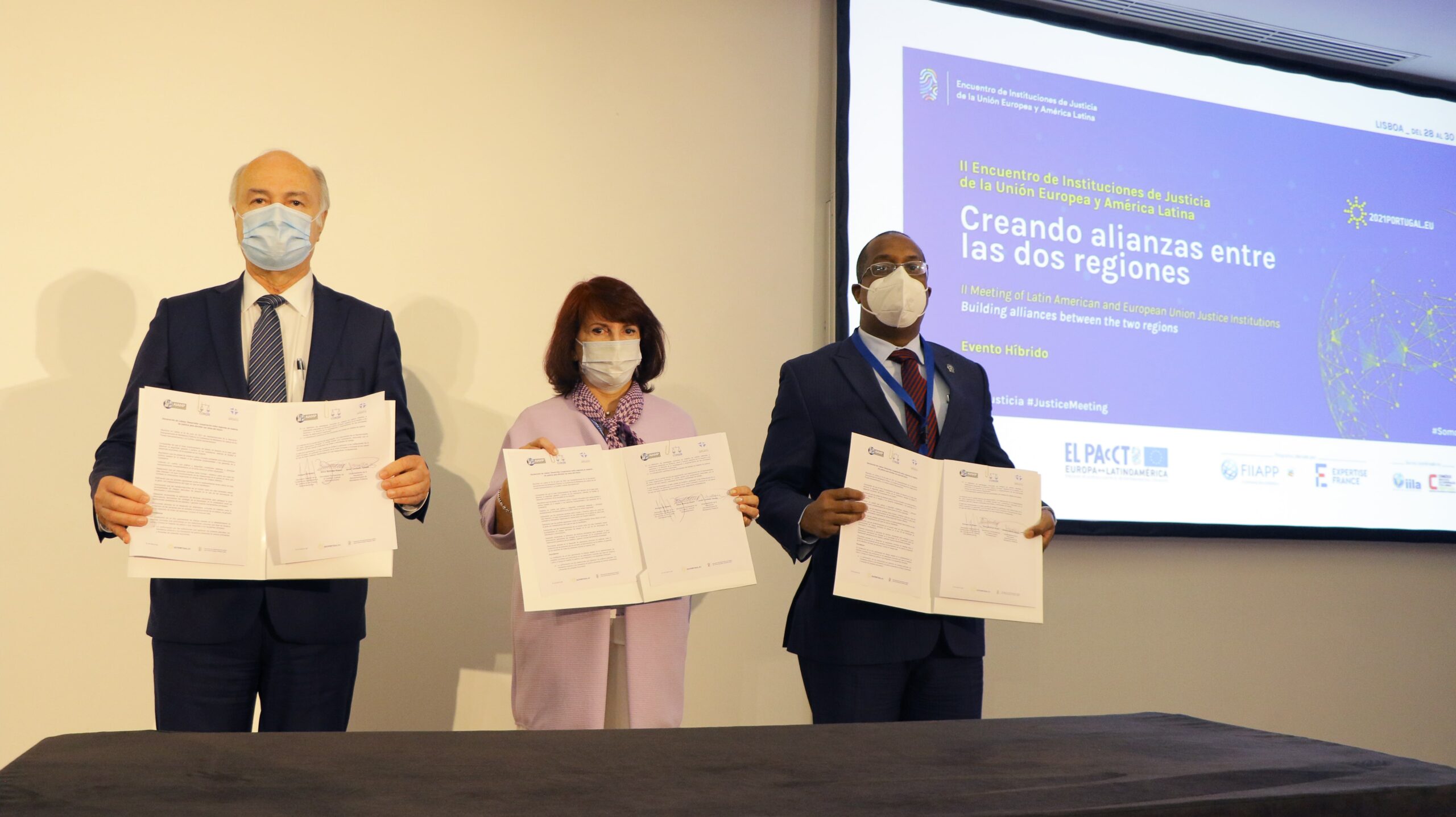The most important justice institutions in Latin America, COMJIB, AIAMP and the Ibero-American Judicial Summit, have signed the ‘Lisbon Declaration’. They thus undertake to establish a permanent dialogue forum through the constitution of a Technical Monitoring Committee made up of representatives from the three institutions. This Committee will be in charge of planning the next meetings. The objective is to address the issues that are on the justice agenda in the European Union and Latin America. The European Commission and Eurojust will be invited to all the meetings to continue moving towards a common justice strategy between the two regions.
The “Lisbon Declaration” has been promoted by EL PAcCTO and, according to Enrique Gil, Secretary General of COMJIB, “the basic and essential aspect is that, at last, cooperation between Latin America and the European Union was coordinated”. The Attorney General in Charge of Panama and Vice President of AIMAP, Javier Enrique Caraballo Salazar, recognises that “without a doubt it is a step forward in cooperation between Europe and Latin America that enables the justice bodies in both regions to reach common agreements on issues of mutual interest”. For the Permanent Secretary of the Ibero-American Judicial Summit, Elena Martínez Rosso, this means “a commitment to create a forum where all the proposals that were raised here continue to be debated and deepened”.
“It is an opportunity to lay the foundations that allow us to adequately define the operating standards of justice in the face of present and future challenges,” said Antonio Roma, who is a prosecutor and coordinator of cooperation between justice systems with EL PAcCTO, in the closing ceremony to the event.
This important agreement has been reached within the framework of the 2nd Meeting of Justice Institutions of the European Union and Latin America held in Lisbon from 28 to 30 June, which was organised by the EU’s EL PAcCTO programme.
More than 20 regional representatives from the Latin American countries, Spain and Portugal participated in the event, which took place in a hybrid format. It was also attended by the EU Directorate General of Justice, or Eurojust.
From the environment to digital privacy or protecting digital footprints
The justice institutions that have signed the Lisbon Declaration undertake to continue working on the matters that are on the international agenda, “estimating that major aggressions against the environment have an effect all over the globe, wishing to increase the application of the techniques needed to prosecute major crimes, generate new procedural tools based on technology; seeking to develop common standards in matters such as the protection of the people who are subjected to crimes and guaranteeing the rights of all people, including habeas data”. The objective of the dialogue forum focuses on establishing specific measures that deepen the common standards of the two regions.
Justice, fundamental to a post-pandemic world
During the event, held within the framework of the Portuguese Presidency of the Council of the European Union, the Portuguese Minister of Justice, Francisca Van Dunem, recalled that “we live in a globalised world, in which territorial borders are no longer barriers or obstacles to criminal activity, especially in this digital age. The pandemic created the conditions for organised criminal groups to focus their action on illegal activities. Including: counterfeiting medicines, medical products and equipment. We are witnessing a resurgence in racism, xenophobia and hate speech, fuelled by fake news and misinformation. These are priority issues in Europe and they were also, and are, a priority for Justice during the Presidency of the Council of the European Union.”
Meanwhile, Didier Reynders, EU Commissioner for Justice, stated that “the EU’s commitment is total thanks to initiatives such as EL PAcCTO and its involvement in numerous countries. The fight against and prevention of crime is something that needs to be better addressed at the regional and transnational level. Crime has grown since the pandemic in 2020 and is adapting rapidly. It is essential to defend justice systems and reinforce the role of education and engagement with victims. Justice is fundamental in a new post-pandemic world and in defending democracy and human rights.”
There were three days of debates between representatives of the most important justice institutions in the European Union and Latin America. Objective: to strengthen the work undertaken between the two regions and to tackle the challenges of the future together.
The Lisbon Declaration will set out this path for the next few years.
